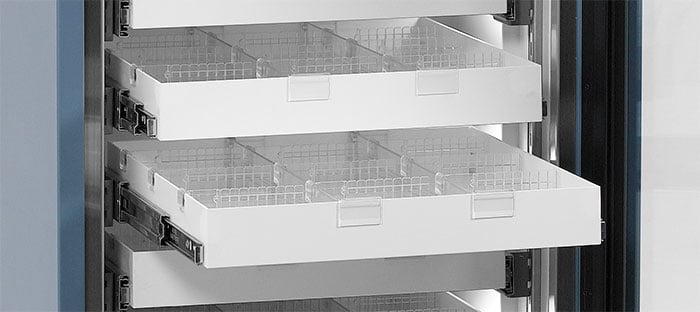
It is the pharmacy’s responsibility to accurately and timely distribute medications to patients. Traditionally, technicians prepared doses, pharmacists would check their work, and then medications were dispensed to the patient-care units in medication carts which held the drugs in individual patient cassettes(1). This method has since been replaced with the use of automated dispensing cabinets (ADCs) at the point of care.
ADCs are decentralized medication-distributions systems that offer controlled storage, dispensing, and tracking of drugs at the point of care. They were developed to enhance efficiency and effectiveness of medication distribution. Five years ago, only half of US hospitals relied on ADCs, while today, over 90% of hospitals in the United States currently use ADCs(2). This new technology is rapidly changing the way pharmacists view medication distribution. ADCs offer many benefits to hospitals including enhanced medication security, reductions in medications errors, improved access to medications for nurses, and more efficient and effective medication billing and inventory management.
It is important to note that some of the medication supplied at the point of care must be refrigerated. Using medical-grade cold storage, versus general purpose or commercial style, helps to ensure the quality of sensitive and expensive medications and vaccines. Medical-grade refrigerators are designed specifically for clinical applications, and maintain uniform temperatures throughout all storage locations to eliminate risks of medications or vaccines being exposed to improper conditions that could affect patient safety. In addition, medical-grade refrigerators use forced-air refrigeration to quickly recover temperature after door openings, which can be a frequent event in busy medication rooms. Leading ADC manufacturers have developed cold storage locks and door brackets that can be affixed to medical-grade refrigerators or freezers. These locks are then controlled by the central unit making the user go through the ADC to retrieve the refrigerated medication. By using a medical-grade refrigerator or freezer with an ADC and lock, not only are medications stored safely at appropriate temperatures, they are also secured and verified.
Although medical-grade cold storage is equipped with advanced alarms and monitoring, some ADC locks also monitor refrigerator and freezer temperatures and signal a warning alert if the storage unit is outside of temperature range. These features may assist facilities with regulatory compliance.
Helmer undercounter and upright refrigerators and freezers are compatible with all major ADC locks. In some cases, specific accessories are used to facilitate installation. These include special handles for upright refrigerators, and adapter kits for undercounter units. The compatible upright refrigerator door handle and/or undercounter refrigerator adaptor kit can be factory or field installed.
Helmer Scientific refrigerators are compatible with leading ADC systems, including:
Helmer refrigerators and freezers are also integrated into the AutoCool®+H and AutoFreeze®+H solutions available from TALYST.
References:
(1) Grissinger, Matthew. "Safeguards for Using and Designing Automated Dispensing Cabinets." Pharmacy and Therapeutics. MediMedia USA, Inc., n.d. Web. 29 Feb. 2016. <http://www.ncbi.nlm.nih.gov/pmc/articles/PMC3462599/>.
(2) "Automated Dispensing Cabinets : State of Pharmacy Automation 2015 - Pharmacy Purchasing & Products Magazine." Automated Dispensing Cabinets : State of Pharmacy Automation 2015 - Pharmacy Purchasing & Products Magazine. N.p., n.d. Web. 29 Feb. 2016. <http://www.pppmag.com/article/1725>.



